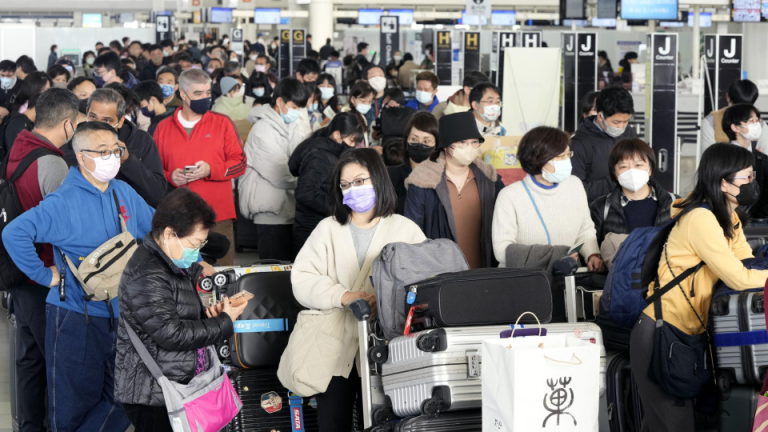Inbound tourism to Japan has begun to pick up since the easing of COVID-19 border controls, but staff shortages have become a growing problem for the airline industry, as many who left their jobs during the pandemic have not returned.
The resignation of airport staff due to a sharp drop in the number of passengers during the height of the pandemic has led to a drop of more than 20 percent in security inspectors nationwide.
Although airlines have made a concerted effort to secure staff for ground operations, many professions in the industry require qualifications and experience, which means that returning to a sufficient staff will take time.
“40 percent of the security staff at Fukuoka Airport have quit during the pandemic. We don’t have a normal situation,” said Tatsuya Yamanaka, assistant director of human resources at security company Nishiki, which conducts security checks at the airport.

A photo taken on February 4, 2023 shows the international terminal building of Fukuoka Airport crowded with passengers. Favorite
While the company was able to handle six lanes of passengers at security checkpoints for international routes before the pandemic, it can currently only manage three to four lanes at a time.
In the international terminal, where the number of visitors to Japan from South Korea, Southeast Asia and other regions has increased dramatically since the easing of border measures, it is now not uncommon to see long lines of people creep through the baggage-check area, with wait times often more than 30. minute. But congestion is also an everyday occurrence for domestic flights.
Yamanaka lamented, “There are many jobs that require national qualifications for inspectors, so even if people are employed, they cannot be employed in the field immediately.”
According to the Ministry of Lands, Infrastructure, Transport and Tourism, there were about 5,600 security inspectors nationwide in September 2022, the latest figures available. In contrast, about 7,400 people held these jobs in April 2020.
Related coverage:
Opening of the hotel shopping complex at Tokyo Haneda Airport
“There is a shortage of (inspectors) nationwide,” said a ministry official in charge of civil aviation.
The growing labor shortage has also affected other international airports in the country. The operator of Sendai International Airport said it could not keep up with the number of daily flights as it returned to pre-pandemic levels, acknowledging that the crowds would be an inconvenience to travelers in the meantime.
While New Chitose, Chubu and Kansai airports do not have staffing problems for security or ground staff, preparations are underway to ensure sufficient staffing for the expected increases in flights from China.
At Fukuoka Airport, the total number of airport employees, including ground staff and store clerks, decreased by about 20 percent from fiscal 2019 to about 6,500.

A joint briefing of 14 companies, including all Nippon Airways and Japan Airlines, was held on January 28, 2023, at Fukuoka Airport to introduce various recruitment positions. Favorite
The recent increase in passenger numbers at the airport stands in sharp contrast to the situation at the height of the pandemic. Passenger numbers at the airport, which fell to nearly 140,000 in May 2020, rebounded to 1.78 million by November 2022 — nearly 80 percent of the monthly average before the outbreak.
Fukuoka International Airport Corporation, which operates Fukuoka Airport, held its first joint briefing at the airport in late January. 14 companies, including All Nippon Airways, Japan Airlines, and Nishikei, held booths with about 570 people in attendance. Various jobs were shown, including baggage loading and aircraft refueling roles.
Related coverage:
Japan aims for a record number of foreign visitors in 2025
Airlines are scrambling to handle the extra load at major hubs such as Haneda and Narita airports, which receive many passengers.
The Afghan National Army is resuming hiring new staff and providing labor support between airports, acknowledging it has a “temporary shortage”. About 70 percent of the group’s employees who were transferred to other companies or local governments have returned.
The JAL Ground Service, which is based in Tokyo and responsible for ground operations, is also lobbying for the transfer of personnel between airports.


